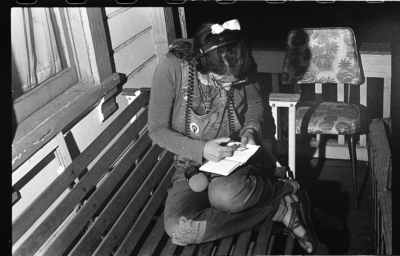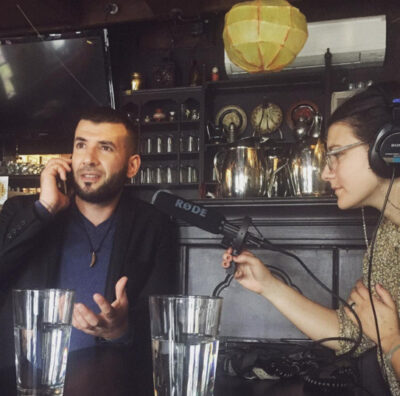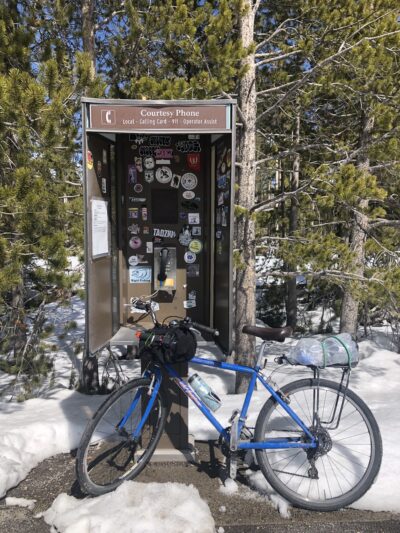The Interview is Only as Good as the Relationship
June 7, 2023
Text by Marissa Perez with Ruth Eddy
“Listening. That’s the number one thing.”
-Ruth Eddy
This is an interview about interviews. I don’t think I’m a good interviewer and Ruth is the best interviewer I know, so who better to ask my burning interview-related questions? When I first met Ruth, she was writing a story about a business called “America’s Noodle” for her neighborhood newsletter. I was impressed by her curiosity and her boldness in going to talk to the people at “America’s Noodle” and I wanted to be just like her. Now, it’s five years later and I still want to be just like Ruth.
Ruth: First, I wanna look up what “interview” means. Like, what’s the definition? Here it is: “A meeting of people face to face, especially for consultation.” Hmm. Yes. Interesting. A structured conversation where one participant asks questions and the other provides answers.
Marissa: There we go. That’s a good one. Because I was just thinking about how this kind of interview is different from a job interview, you know, but they’re both interviews.
Ruth: Wow. I don’t know why I’m immediately having so much fun, thinking about the definition of interview. But it’s hard to know, especially because you are also my friend and I have conversations with you and we ask questions and give answers in those conversations too.
Marissa: That’s cool. I wonder, though, because the definition was when one person asks questions of another, but I wonder can it be people interviewing each other? Can people interview each other at the same time?
Wow. Yeah. But then, is that just a conversation? Does an interview need a power dynamic a little bit? Or roles?
Ruth: Yeah, I think you’re right. This is so funny because I feel like having this conversation slash interview with you makes me feel so good. I think in some ways interviews can be more comfortable because they’re structured, but then they can also be so much more rigid.
Marissa: Ok then, the first question is, what is one favorite question you like to ask people? Which I realize is a hard question.
Ruth: I think I actually know this.

Marissa: Oh, yeah?
Ruth: Well, I guess I should shout out to Anna Deavere Smith. Is that her name?
Yeah, Anna Deavere Smith wrote a book called Talk to Me, and she’s a theater lady. She was an actor who would interview people and then perform as the people she interviewed, like monologues.
Her whole thing was getting the essence of a person. Through speech, I guess. And she said that there are three great questions to ask. I think one of them is where were you born? The next one is, have you ever been close to death? And I can’t remember the third one. I think that those are hard to get into, but I do find myself asking people a lot where you were born. Sometimes we say, where did you grow up? Or, where are you from? And those things can be hard to get into like a conversation around.
Where were you born feels just like a great starting place, because we were all born.
Marissa: Yeah, it’s a good question because it’s an easy question that leads to more questions. Okay. Question number two. What do you think makes an interview good? When I read that question out loud it sounds weird, but it’s the question.
Ruth: Okay, well now this is gonna get really meta, because what if what makes an interview good is when you can also ask questions? And so then I ask you, what do you think makes an interview good?
Marissa: You’re setting the terms and then using them to say that what makes an interview good is me getting to say whatever I want, so I’m gonna say whatever I want…but that wasn’t your answer. Yeah, I don’t know what makes an interview good. Because there are different angles. I’m critical of the question now, because I’m wondering “good” for who?
Ruth: Yeah. And like we were saying at the beginning, there are different types of interviews too.
Marissa: Yeah. We kind of know the rules for a job interview because there’s a goal, you know?
Ruth: And what makes that interview good? It’s probably different from this interview.
Marissa: Okay. Question number three. Who do you want to interview the most? I guess it’s another way of asking, who are you curious about right now?
Ruth: Okay. The first person that comes to mind is Justin Bieber. And I feel like that’s been my answer for a while. I don’t know why.
Marissa: How long is a while?
Ruth: Years.
Marissa: Yeah. He’s changed over the years.
Ruth: I know. I think it’s something weird, and this is why it feels embarrassing, because it feels like that’s more like some reflection of me as an interviewer. It’s because Justin Bieber’s at the top of some access pyramid. Along with the president, but I would rather talk to Justin Bieber.
Marissa: Maybe that’s the answer to a different question too, which is: if you could interview anyone, who would you interview?
Ruth: Yeah. Yeah. But what is the question though?
Marissa: Who do you wanna interview the most right now?
Ruth: I don’t know. I think maybe for someone outside of my world I would need more of that rigid structure, like an interview, whereas the people I wanna talk to are just people that I see around. Like, I would maybe want to interview my postman, but I feel like I don’t want that dynamic between us. I’d rather just have a conversation.

Marissa: Asking someone to interview them sets up a certain dynamic, which sometimes you don’t want, because you just want to relate in the roles that you are already in. But there might be a reason if you’re like, “I want you to come on my radio show,” then there’s a reason to change that dynamic. But when there isn’t, it can feel kind of bad.
Ruth: Yeah, and I think I need to remember that like, I made my radio show to have that reason, but it still doesn’t feel like enough. Okay. Um, what was the question? Did I get it? Justin Bieber. You got it? Justin Bieber.
Marissa: I’ll listen to it later and either I’ll include everything we said or I’ll just include Justin Bieber.
Ruth: The power of editing.
Marissa: Next question is, do you have any advice for me as a novice interviewer compared to you, Ruth, an experienced, mature interviewer?
Ruth: Well, this interview is going great.
Coming up with questions ahead of time is great. A lot of times you want to see where the conversation goes, but as an interviewer, it is good to at least prepare the questions beforehand. It’s also good to abandon them as necessary, which I think we’ve already done.
I kind of wanna say, you don’t have to say, “Question number three, next question,” but I’m also kind of enjoying that right now. So I don’t know how I feel. I think you totally know how to be a great interviewer. Advice… listening. Listening. That’s the number one thing.
I think sharing a little bit about yourself is important. And maybe that’s where these roles are inherent to the interview structure, but also a good interview is going to be based on your relationship that you have with someone.
If it’s someone that you already have a relationship with, then probably the interview will be better. If you don’t have a relationship or not a big relationship with the person you’re interviewing, I think it’s important to try and build a relationship upfront and whether that’s just getting through technical difficulties or just having a little chit chat about yourself to build a better relationship because the interview is probably just as good as the relationship.
Marissa: What do you think about silence? I feel like you’re good at silence.
Ruth: …(silence)…
Marissa: You can’t answer it in silence. It’s an interview.
Ruth: I’m doing it. This is representative.
I guess I have two thoughts on that. Especially interviewing for audio, which is my area. I’ve really gotten better at nonverbal communication, which is basically just nodding instead of saying mm-hmm, or all the other things that we usually say out loud. Being able to do non-verbal communication while someone is talking shows that you’re listening without your voice being heard. So I think practicing non-verbal communication is great if you’re trying to record an interview. It’s also a good practice that allows for silence because silence can be uncomfortable only when it feels like there’s a disconnect and you’re like, “Are you hearing me? Can you hear me? Are you paying attention?” And if you can communicate in other ways, like with eye contact or with nodding, that you’re paying attention, then the silence can exist and not be uncomfortable. And usually that gives time for someone to think and then they can share a new idea that they came up with when they’re just being quiet and thinking.
Or it could just be silent. I don’t know. Silence is cool. Makes me just wanna be quiet now.
Marissa: I know. Now I’m nodding and being quiet more.
Ruth: Okay. There’s another thing about silence and audio recordings, especially when you’re doing an interview that’s going to be edited. You are tasked with gathering what’s called room tone, which is just the sound of a room, because every room you’re talking in is gonna have a different sound, and so you wanna have like two minutes of silence in the room, which is always hilarious.
Marissa: Do you do it at the beginning or at the end or both?
Ruth: I think usually I do it at the end, but now that I’m thinking about it, it feels like it could be good at the beginning too, but it definitely is too weird I think to do at the beginning.
Marissa: Okay. Oh, this is kind of changing the topic, the question is… we talk a lot about time. Have you had any new thoughts about time or seen any good clocks?
Ruth: Okay, this is like a great interview question because you know about our relationship. It shows that you know who I am and what I like to talk about.
I’m always seeing good clocks. And, I mean, it’s spring. I feel like more than anything, this feels like the time of the year where I feel most like connected to time, like in the biggest way possible, just like cycles of life.
Marissa: Well, right now in Portland, it’s the time where it’s like, here’s the next thing blooming and the next thing blooming and the next thing blooming.
And that can stress me out. Because I wanna see it all, and I don’t wanna miss a thing because everything’s so liminal. In winter the branches are going to be bare and tomorrow they’re still going to be bare.
So I haven’t been thinking about time, but I think I’ve been feeling it, you know?
Ruth: Yeah. A plant can really just come up overnight or bloom.
Marissa: Is it warm there?
Ruth: It is. This weekend spring was unlocked. It was in the seventies this weekend. And the trees have buds. Things are happening.
Marissa: Okay, last question. What would a dream radio show be? Or what’s a radio show you’re dreaming about right now?
Ruth: This is exciting because this is what I love to talk to you about, just my dreams, and then figuring out if they’re good ideas or bad ideas by saying them out loud to someone else.
Um, okay, so I have a radio show today. And I’m kind of excited because I think I have a map of what it will be and I want to include some voicemails that I got. I went biking in Yellowstone and right in like the middle of the park there was this payphone, but it actually wasn’t a payphone, it was a courtesy phone, which means you can make local calls for free, and I think local is defined by the area code and the whole state of Montana is in one area code.

So I called my own radio show and left a voicemail. And then I really wanted to put a sticker up because the booth was covered with people’s Instagram stickers or whatever. But I didn’t have a sticker with the phone number on it.
But then I hung around there and some other bikers came by, and then I wrote the phone number in the snow. So I think I got like two voicemails from the courtesy phone in the middle of Yellowstone National Park that I wanna play.
Marissa: From the phone number you wrote in the snow?
Ruth: Yeah. So I wanna play those. And then yesterday a friend came to visit and we drove out a ways, just up into the farmland and mountain lands to this spot that Eben used to go to as a teenager, this abandoned homestead. And I was recording audio there. It was very windy and I kind of like wind because it feels like it bends the rules. Wind is supposed to be the audio recorder enemy, but it’s also such a good sound. It’s like, let’s just play the wind, let’s really listen to the wind. So I wanna play a bunch of wind and this interview with Eben, my friend, in this abandoned house that he used to go to.
And I also just wanna give a shout out to you because when I was in this abandoned house recording yesterday, the way that I phrased it was not “Can I do an interview?”I used a phrase that I think I got from you, which is “Can you give me a tour of this place?”
And that felt so nice to be anchoring it in space. And I wanna do that more. So that’s a dream.
Marissa: Yeah. And I like that. It’s more like, let’s talk about this thing together. Or let’s talk about this place together and you walk me through it, or let’s go on a walk or, can you show me?
Ruth: Yeah, I think I would like to try and maybe do that more.
And I was just gonna end this interview, but I wanted to say I found the questions. Okay. So the three questions from Anna Deavere Smith are: have you ever come close to death? Do you know the circumstances of your birth? And have you ever been accused of something that you did not do?
Ruth Eddy (she/her) is the host of Radio Hangout on www.KGVM.org Tuesdays 5-6 MST . She is a collector of sounds and trash, lives in a tiny shiny trailer and produces podcasts in Bozeman, MT. www.therutheddy.com
Marissa Perez (she/her) grew up in Portland, Oregon. She is a printmaker, party host, babysitter and youth worker. She’s interested in neighborhoods and the layers of relationships that can be hard to see. Her dad was a mail carrier for 30 years and her mom is a pharmacist.


